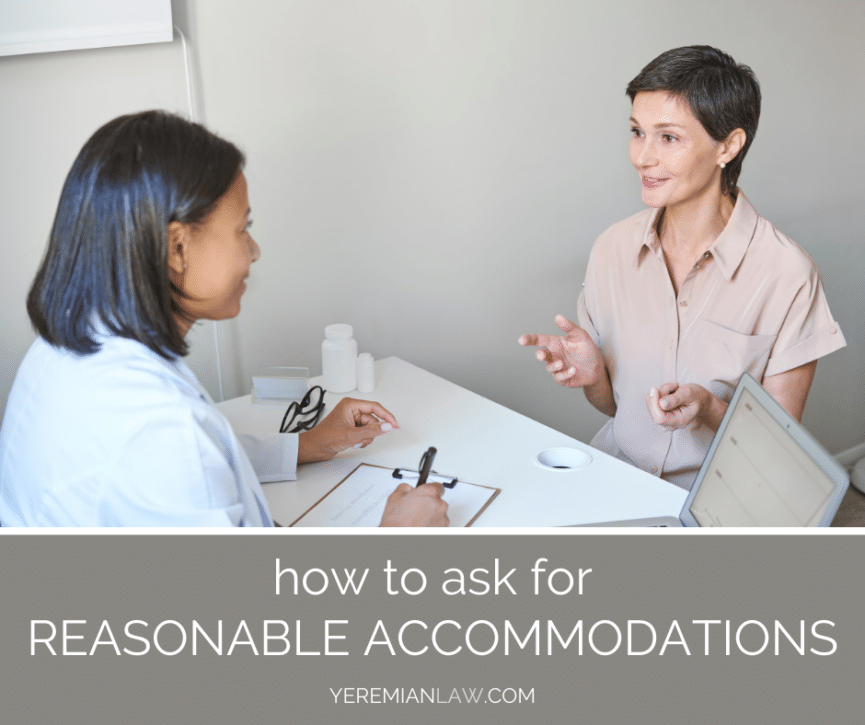If you’re like many people, you need accommodations to make performing your job easier or safer. But how do you ask your employer? This guide explains.
How to Ask for Reasonable Accommodations at Work
Asking for reasonable accommodations in your workplace should be easy; the process is designed to make it that way. In fact, it could be as simple as having a quick conversation with your supervisor or first-line leader. It’s important to note that requests for reasonable accommodations do not need to be in writing.
Under the Americans with Disabilities Act, all you need to do is inform your employer that you need an adjustment or change at work due to a reason related to your medical condition. You don’t have to get all technical, either; you may use plain English, and you don’t need to mention the ADA or even the phrase reasonable accommodation.
Here are three acceptable examples of ways to ask for reasonable accommodations at work:
- Jane tells her supervisor, “I’m having a difficult time arriving at work at my scheduled starting time because of medical appointments and treatments I receive.”
- Jim, who uses a wheelchair, lets his supervisor know that his wheelchair doesn’t fit under his desk.
- Susan tells her manager, “I need two weeks off work so I may get treatment for a back problem.”
Each of these is considered a request, under the ADA, for reasonable accommodations. However, you may specifically ask for a reasonable accommodation if necessary.
Related: What is disability discrimination?
Does Your Employer Have to Provide You With an Accommodation?
Employers are required to provide reasonable accommodations when they don’t cause an undue hardship. However, if an accommodation request would cause an undue hardship on the company, they most likely aren’t required to make changes. For example, it is reasonable to ask an employer for a desk under which your wheelchair fits. However, it is most likely unreasonable to ask an employer to install an elevator in a rented building.
Related: What disabilities are protected against discrimination?
When to Ask for a Reasonable Accommodation
You should ask for a reasonable accommodation as soon as you realize you need one. If possible, try to ask for an accommodation before your work performance suffers.
An Employer’s Responsibility After Receiving a Request for Reasonable Accommodation
The best response an employer can give a person who requests reasonable accommodations is, “Okay, let’s work together to figure out how we can make this work.” Your employer may ask for your input and suggestions so that those in charge of making decisions can provide you with the appropriate type of accommodations.
However, that doesn’t always happen.
After you request reasonable accommodations, your employer has a duty to get the information necessary to make the right decision. That may mean your employer can ask you for proof, but not if your disability is obvious. For example, if you ask your employer to change your job duties because you’re having difficulty reaching tools due to a back injury your employer is allowed to ask you for documentation that describes the nature of your injury and how it impacts your ability to perform the job. On the other hand, if it is obvious that your wheelchair doesn’t fit under your desk, your employer cannot ask you for proof that you have a condition that requires you to sit in a wheelchair.
Related: What can you do about disability discrimination at work?
Can Your Employer Require You to Go to a Doctor of Its Choice (Rather Than Your Own) to Document a Need for Accommodation?
If you don’t provide sufficient information from your physician or another health care professional, the ADA does not prohibit your employer from requiring you to go to a health care professional of its choice. In plain English, that means that your employer can tell you that you must go to a certain doctor for an evaluation if you don’t provide adequate information from your own doctor.
Related: Disability discrimination for non-physical disabilities
Do You Need to Talk to an Attorney About Reasonable Accommodations?
If you have questions about reasonable accommodations, or if your employer has refused to help you, we’re here. Call us at 818-230-8380 or fill out the form below to schedule your free consultation with an experienced and caring attorney now.




